Table of Contents
Tryptophan is the sole precursor of serotonin. L-Tryptophan’s role in brain serotonin synthesis is critical for mood, behavior and cognition.
Serotonin is often referred to as the “happiness molecule”. Low serotonin levels can result in pain, insomnia, depression, seasonal affective disorder, and chronic fatigue.
For your body to manufacture serotonin, it needs an adequate supply of the natural amino acid Tryptophan. As a nootropic supplement, Tryptophan is used for anxiety, ADHD, depression, insomnia, memory loss, pain, and eating disorders.[i]
A lack of bioavailable Tryptophan in your body can have a big impact on your life.
Tryptophan helps:
- Anxiety & Mood. Tryptophan is an essential amino acid needed to synthesize serotonin which plays a role in mood, sleep, learning and even appetite control.
- ADHD. Low levels of Tryptophan and serotonin imbalances in the brain are associated with ADHD. Studies have found that children with ADHD have 50% lower than average levels of Tryptophan.[ii]
- Neurotransmitters. Low levels of Tryptophan can result in short- and long-term memory loss. Supplementing with Tryptophan has been found to improve memory in healthy adults.
Overview
Tryptophan is an essential amino acid and precursor to serotonin, melatonin and niacin (Vitamin B3) in your body.
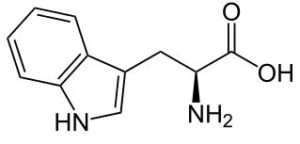
The enzyme Tryptophan hydroxylase converts Tryptophan into 5-HTP (5-hydroxytryptophan).
The decarboxylation of 5-HTP to serotonin is dependent on the presence of Vitamin B6, also called pyridoxal 5’-phosphate (P5P).
The further conversion of serotonin into melatonin requires the presence of SAM-e (S-Adenosyl-L-methionine).
Tryptophan is found in foods like oats, bananas, dried prunes, milk, tuna, cheese, bread, chicken, turkey, peanuts and chocolate.
Eating food containing Tryptophan will increase levels of this amino acid in your body. But not necessarily boost serotonin levels in your brain. Here’s why…
Tryptophan is one of 8 essential amino acids and has the lowest concentration in the body of all the amino acids. Tryptophan requires and competes for active transport to the brain. And competes for the same receptors as the other amino acids.
Research has also found that serotonin levels are enhanced by carbohydrates in your meals because insulin release accelerates the serum removal of some of the amino acids that Tryptophan is competing with.
And if your meal has a higher percentage of proteins, it also slows serotonin elevation in your brain.[iii]
Since Tryptophan from food has issues working its way to your brain to make serotonin, why not skip that step and supplement with 5-HTP instead? Tryptophan and 5-HTP both penetrate the blood-brain barrier. And 5-HTP is the intermediate step in serotonin synthesis.
See my post on 5-HTP for more on why supplementing with 5-HTP instead of Tryptophan is not such a good idea.
How does Tryptophan work in the Brain?
Tryptophan boosts brain health and function in several ways. But two in particular stand out.
- Tryptophan boosts memory. Tryptophan’s main nootropic mechanism of action is as a precursor to the neurotransmitter serotonin. Other neurotransmitters such as melatonin and beta-endorphin increase following Tryptophan supplementation.[iv]
Research shows that Tryptophan and serotonin play a significant role in memory. Enhanced brain serotonin has been shown to improve cognitive performance in animals and humans. And decreasing levels of serotonin through Tryptophan depletion impairs cognition.
A study done in Pakistan assessed memory in rats following Tryptophan administration. The rats received Tryptophan doses of 50 and 100 mg/kg of body weight for 6 weeks. The study showed significant improvement in memory of rats following both doses of Tryptophan.[v]
- Tryptophan enhances mood. As a precursor to serotonin, Tryptophan can have a significant effect on mood. Supplementing with Tryptophan has been found to increase not only serotonin, but growth hormone and prolactin as well.
Researchers infused 11 healthy male subjects with doses of 5, 7.5 and 10 grams of Tryptophan. And then monitored their hormonal and behavioral responses.
Tryptophan produced significant effects on mental and physical sedation but did not increase levels of tranquilization. Tryptophan provided a calming effect without knocking these guys out even at high doses.[vi]
How things go bad
As we get older, our brain chemistry and energy metabolism changes.
↓ Tryptophan levels decline
↓ Tryptophan hydroxylase levels decline
↑ Stress, insulin resistance and age increase
↓ Magnesium and Vitamin B6 levels decline
↓ Neurotransmitter levels decline
↓ Concentration, working memory and executive function decline
↓ Appetite regulation, energy and alertness decline
All of these changes can happen at an age. And are influenced by declining Tryptophan levels. Very little dietary Tryptophan is available for protein and serotonin synthesis. And for many people this can be a problem.
Anxiety, depression, ADHD, memory loss, binge eating and a host of other mental and physical issues have been correlated with low Tryptophan levels.
Tryptophan benefits
Just living in our modern society seems to leave us irritable, stressed-out, and anxious. Worst case is problems sleeping, depression, aggressive behavior, reduced motivation, pain and even suicidal thinking.
 And all have been traced to not enough serotonin in our brain.[vii]
And all have been traced to not enough serotonin in our brain.[vii]
Serotonin, the happiness molecule relies on an adequate supply of Tryptophan for synthesis. Researchers now recognize that the role serotonin plays in psychiatric and behavior disturbances comes from Tryptophan depletion.[viii]
Tryptophan hydroxylase is the rate-limiting enzyme needed for serotonin production. And is involved in the conversion of Tryptophan to 5-HTP (5-Hydroxytryptophan) needed to make serotonin.
This enzyme (Tryptophan hydroxylase) can be inhibited by stress, insulin resistance, magnesium or Vitamin B6 deficiency, or increasing age.
Tryptophan and 5-HTP can penetrate the blood-brain barrier. But Tryptophan requires active transport and competes for the same receptors with other amino acids including tyrosine, phenylalanine, valine, leucine, and isoleucine.[ix]
To complicate things even more, serotonin levels are enhanced by carbohydrates in our diet because insulin release accelerates serum removal of the amino acids competing for Tryptophan transport. And high levels of protein in our diet slows increase in serotonin.[x]
So now you know why it’s helpful to add supplemental L-Tryptophan to your nootropic stack.
How does Tryptophan feel?
Many try L-Tryptophan the first time to cure insomnia or as an alternative to prescription sleep meds.
Dosing L-Tryptophan in the evening will typically ensure you’ll feel great the next day. You should have more energy for working out.
Anxiety levels should decrease. Happiness levels should rise. Tryptophan could help with memory. Music will sound better. Feelings of self-esteem will improve.
Some neurohackers report being able to taper off prescription antidepressant meds by supplementing with L-Tryptophan.
Tryptophan Clinical Research
5-HTP and Tryptophan are natural alternatives for the treatment of depression. And often used as alternatives to prescription antidepressant treatments because they don’t come with the side effects associated with antidepressant drugs.
But as neurohackers we don’t have a lot of research to help us decide if supplementing with Tryptophan makes sense. (If we base our decisions on clinical trials).
Much of the research looks at finding out if low levels of Tryptophan are associated with depression and poor cognition. But there is very little clinical evidence that supplementing with Tryptophan will help reverse low Tryptophan levels. And if adding this nootropic to our stack will boost mood and cognition.
Researchers at the University of Queensland in Australia decided to comb through the research to find out if clinical trials supported the natural health claims of using 5-HTP and/or Tryptophan for depression.
The team located 108 trials of which only 2 studies involving a total of 64 people had sufficient data to qualify. The team concluded that the very limited data showed 5-HTP and Tryptophan better that placebo for alleviating depression. But that larger and more studies were needed before their widespread use could be recommended.[xi]
Low Tryptophan = Depression and Poor Cognition
20 patients in remission or partial remission from depression were studied in a double-blind, crossover design trial. Tryptophan was artificially depleted in these patients so scientists could look at the effects on cognition and mood.
The research team found what we see in real life. Lower levels of Tryptophan had a negative effect on mood, their ability to process positive information, and attention.[xii]
Tryptophan Helps Manage Depression
Serotonin has been recognized as the neurotransmitter that is key to managing depression for the last 30 years. Most of the prescription drug therapies for depression work by raising serotonin levels at the relevant synapses.
We also know that Tryptophan is the immediate precursor to serotonin in the brain. So researchers, using a “what came first, the chicken or the egg” approach decided to find out if low serotonin levels or low Tryptophan levels were to blame for depression symptoms.
Researchers in China analyzed levels of Tyrosine, Tryptophan and serotonin in patients with major depressive disorder. And found that all three were decreased in depressed patients. (Note that Tyrosine is a precursor to dopamine in the brain).[xiii]
The Center for Addiction and Health in Toronto conducted a randomized, double-blind, placebo-controlled trial with 30 depressed individuals. Treatment was fluoxetine (Prozac®) 20 mg per day, 2-4 grams of Tryptophan per day or a placebo for 8 weeks.
Mood was assessed using the Hamilton Depression Rating Scale and the Beck Depression Index during the trial. During the 1st week there was a significant decrease in depression in those who used fluoxetine or Tryptophan.
At 4 weeks the research team recorded a disruption in sleep patterns for those using fluoxetine or a placebo. But not the Tryptophan group.
The team concluded that combining 20 mg of fluoxetine with 2 g of Tryptophan was a safe protocol for treating depression. Patients experienced a rapid decrease in depressive symptoms. And the combination had a protective effect on sleep patterns.[xiv]
DO NOT TRY THIS AT HOME. The trials combining Tryptophan with SSRI’s, SNRI’s and MAOI’s are all done under professional supervision. But remember, Tryptophan is a precursor to serotonin. And antidepressant meds also boost serotonin in the brain. When combined, serotonin levels are boosted even more.
Herein lies the problem. If you increase serotonin too much, you put yourself in real danger of Serotonin Syndrome. Which can lead to all kinds of nasty side effects. Including death.[xv]
DO NOT combine Tryptophan with antidepressant meds unless you are doing so under the careful supervision of a doctor. It is much too dangerous attempting this on your own.
Tryptophan Boosts Exercise Performance
Ever wondered why you cut a workout session short even though physical fatigue wasn’t an issue? Researchers found it could be due to low Tryptophan levels. And its effects on serotonin in your brain.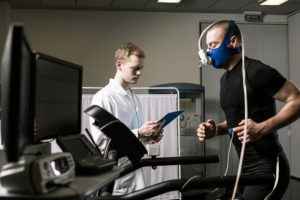
20 healthy young men aged 21 years used a cycle ergometer at about 50% of their physical capacity for 10 minutes followed by maximum intensity exercise for another 30 minutes. This sequence was repeated 3-times, and after the 4th series, each participant continued at the highest speed they could sustain for 20 minutes.
This protocol was performed twice: once with and once without Tryptophan. Researchers found peak power output during the last 20 minutes were higher on trials performed with Tryptophan than those who performed on a placebo.[xvi]
Another trial in Spain recruited 12 healthy sportsmen who ran on a treadmill until exhaustion. Once while supplementing with Tryptophan and once with a placebo.
Total exercise time, perceived exertion rate, maximum heart rate, peak oxygen consumption, pulse recovery rate, and excess post-exercise oxygen consumption were determined during the two trials.
Total exercise time was nearly 50% greater after receiving Tryptophan than after receiving a placebo. Perceived exertion rate was lower when using Tryptophan.
The researchers concluded that the longer exercise time could be due to increased pain tolerance as a result of Tryptophan supplementation.[xvii]
Tryptophan Relieves Symptoms of Seasonal Affective Disorder
Seasonal Affective Disorder (SAD) is a form of depression experienced by many during the winter months. Symptoms include difficulty waking, decreased energy, weight gain, carbohydrate craving, difficulty concentrating, decreased libido, withdrawal, anxiety, depression and irritability.
The first order of treatment is often light therapy. But many do not respond to light therapy typically because of a mutation in the melanopsin gene and the associated signaling pathway between the retina and the pineal gland.[xviii]
The pineal gland in your brain is your source of melatonin which influences sleep cycles. Melatonin is synthesized from serotonin which is synthesized from Tryptophan.[xix]
So if light therapy doesn’t work, possibly supplementing with Tryptophan to stimulate production of serotonin and melatonin could be effective.
Researchers at the University of British Columbia in Vancouver, Canada set out to find if Tryptophan could help those with Seasonal Affective Disorder (SAD) where light therapy failed.
Patients were treated for 2 weeks using light therapy. Those who did not respond to light therapy were treated with 1 g Tryptophan 3-times per day for 2 weeks while continuing light therapy.
The addition of Tryptophan resulted in a significant reduction in depression. 64% of the patients in this study showed very good clinical responses to the combined treatment with minimal side effects.[xx]
Tryptophan Recommended Dosage
Recommended dosage of Tryptophan is 500 – 1,000 mg per day for cognitive benefit.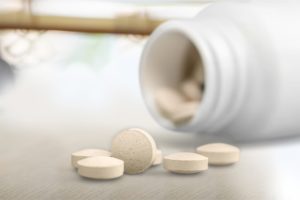
The University of Michigan Health Department recommends much higher doses for:
- Lowering appetite and cravings: .5 – 2 grams per day
- Depression or Anxiety: 2 – 6 grams per day (with medical supervision)
- Chronic pain or migraines: 2 – 4 grams per day in divided doses
- Sleep disorders or insomnia: 1 – 2 grams at bedtime[xxi]
Tryptophan is a precursor to the neurotransmitter serotonin in the brain. Tryptophan hydroxylase is the rate-limiting enzyme needed for serotonin production. And requires magnesium and Vitamin B6 to synthesize serotonin.
Tryptophan is also a precursor to the synthesis of Vitamin B3 (niacin). So if you don’t have enough niacin in your body, supplementing with L-Tryptophan will not efficiently produce serotonin because it’s being used to produce niacin. Which also depletes stores of the vitamin cofactors B1, B2 and B6.
So supplement L-Tryptophan with a B-Vitamin complex that includes Vitamins B3 and B6, and magnesium.
Note that some of the clinical trials used in this post use much higher doses of Tryptophan. Which is not recommended and usually not necessary.
Too much Tryptophan will make you sleepy. And could produce excess levels of 5-HTP and serotonin which can lead to Serotonin Syndrome.
Tryptophan Side Effects
Tryptophan is a normal part of your diet and considered non-toxic and safe at recommended doses.
But in the unlikely event that you already have adequate levels of Tryptophan in your body, supplementing with more could cause problems. As can dosing more that the recommended amount.
Tryptophan could cause stomach upset, loss of appetite, nausea, heartburn, drowsiness, headaches, dry mouth and sexual problems.
Start at the lowest dose to see how your body reacts. When first starting with L-Tryptophan take your dose in the evening to avoid possible drowsiness issues.
Caution: Low to moderate doses of Tryptophan (30 mg per pound of body weight), or about 4.5 grams for the average 165 lb. adult is considered safe and free of side effects. However, most don’t need to dose at nearly these levels.
DO NOT use L-Tryptophan if you are taking antidepressant medications including SSRI’s. Because these drugs delay normal degradation of serotonin in brain synapses leaving more serotonin circulating in your brain.
Too much Tryptophan in combination with these drugs can produce Serotonin Syndrome which can lead to delirium, involuntary muscle contractions, high fever, and coma. And worse case and a very real scenario is death.[xxii]
Type of Tryptophan to buy
L-Tryptophan is available in tablet and capsule form usually 500 – 1,000 mg.
You also get Tryptophan in foods you eat including chocolate, oats, bananas, dried dates, milk, cottage cheese, meat, fish, turkey, and peanuts.
Approximately 300 mg of Tryptophan is available in three ounces of turkey, lamb, beef, tuna, or peanuts. Fortunately, relative to other amino acids, small amounts are needed for a therapeutic effect.
And you get 200 mg L-Tryptophan in Performance Lab® Sleep which also contains 100 mg magnesium (as Magnesium Bisglycinate, Magnesium Taurate, & NutriGenesis® Magnesium) and 500 mg Montmorency Tart Cherry (as CherryPURE®).
But there are all kinds of reasons why your body may not be making good use of the Tryptophan you’re getting from food. See “Tryptophan Benefits” for more on why it may be a good idea for you add Tryptophan to your stack.
Nootropics Expert Recommendation
Tryptophan 500 – 1,000 mg per day
 I recommend using Tryptophan as a nootropic supplement.
I recommend using Tryptophan as a nootropic supplement.
Your body does get some Tryptophan from the food you eat. But this amino acid is competing with other amino acids for transport to your brain. It’s competing for the same receptors. And carbohydrates vs. proteins in your meals can affect Tryptophan’s ability to synthesize serotonin in your brain.
Supplementing with L-Tryptophan will make more of this amino acid available to synthesize serotonin and melatonin.
L-Tryptophan is especially helpful for those with low serotonin levels. Boosting this crucial neurotransmitter can help alleviate insomnia, pain, depression and anxiety.
Start with 500 mg of L-Tryptophan per day and take it in the evening. See how your body reacts and how you feel the next day. Increase the dose to no more than 2 grams per day as needed. And watch for side effects.
L-Tryptophan requires adequate levels of Vitamin B3, B6 and magnesium for serotonin synthesis. So add a good B-Complex vitamin and magnesium to your stack when using L-Tryptophan.
And if you’re dealing with insomnia, consider trying Performance Lab® Sleep which contains 200 mg L-Tryptophan.

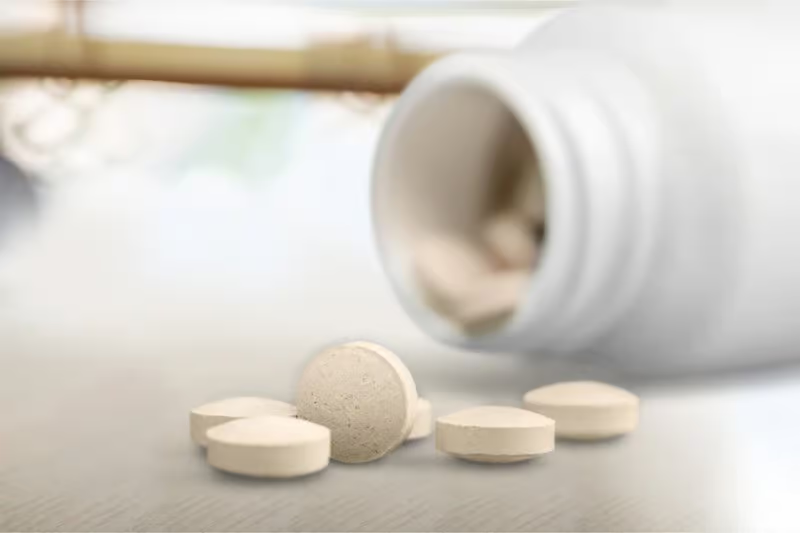
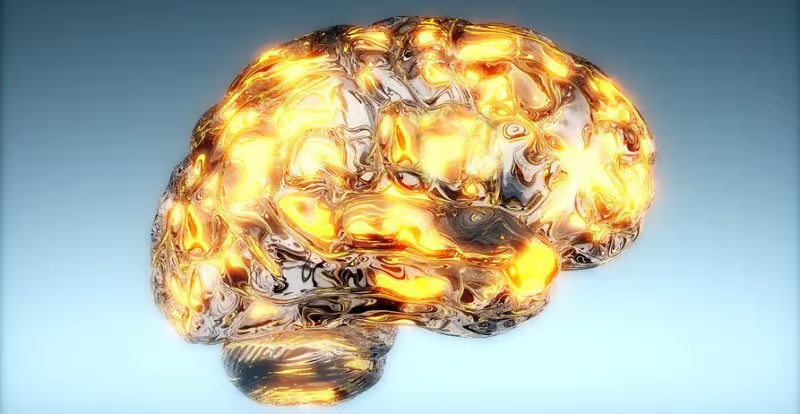






Join The Discussion - 378 comments
Shaan
March 9, 2021
Hey David!!
I know that one should be especially careful when supplementing 5-HTP with certain stimulants and medications due to a risk of serotonin syndrome from the lack of the rate-limiting factor, but would tryptophan hold true for that too?
I know that tryptophan is not converted all at once to serotonin, and is also converted to other chemicals in the body, so you wouldn’t be receiving a spike in serotonin levels, but would supplementing tryptophan with a daily dose of Dextroamphetamine be something to be concerned about? I’ve tried looking all over for information on tryptophan supplementation with amphetamines but I have yet to find anyone who’s done it and reported about it. I know there are some people who have supplemented 5-HTP with their daily dose and have not noticed any problems with, I think, dosages of up to 250mg. That sketches me out a little, and I’d prefer to stay away from 5-HTP in case there is any risk of serotonin syndrome with combining it with Dextroamphetamine, but would tryptophan hold the risk of SS in combination with Dex? Does 5-HTP even hold any risk? Or am I misunderstanding the impact of amphetamines on serotonin? I know with certain ones it is definitely risky and not a combination to go for, but those all have significantly more serotonin action than regular amphetamine.
I take 15mg of Dexedrine a day for ADHD and thought that it would be beneficial to start supplementing some alongside the tyrosine I am supplementing, just to keep things nicely balanced. Is this even necessary?
Thanks,
Shaan
David Tomen
March 9, 2021
Shaan, your ADHD stimulant will work much better if you followed this: https://nootropicsexpert.com/best-nootropics-for-adhd-add/
I suggest avoiding 5-HTP simply because you don’t need it. You can increase serotonin safely with L-Tryptophan. You do not want to be using it with a prescription SSRIs but it’s not a worry with ADHD stimulants. I use Ritalin and L-Tryptophan every day with zero problems.
Erica
March 5, 2021
I bought mind lab pro but I want Tryptophan, where would you recommend I buy some? Thank you so much!
David Tomen
March 6, 2021
Erica, this is the Tryptophan that I use: https://amzn.to/3uUvA65
Sven
March 5, 2021
Hi David, can long term supplementation of Tryptophan suppress dopamine, like long term supplementation of Tyrosine can suppress serotonin?
David Tomen
March 5, 2021
Sven, it depends on how much of each you use. For example, 500 mg L-Tyrosine per day long-term is unlikely to upset the dopamine/serotonin balance. Same the other way around.
If you use mega-doses of L-Tryptophan then it could be a problem.
Gregory
March 3, 2021
Hello David, i wanted to know please Which of the following Nootropics may be being harmful to the liver, recently my medical studies were altered at the liver level and it is one of these products that is the cause, i need remove one of them from my stack
My stack is:
Before sleep: Glycine 3 grams Now, Taurine 1 gram Now, Magnesium Glycinate 400 mg Dr Best, Inositol 500 grams Now, 500 mg Tryptofan Now
And
In the day: Two per Day Life Extension, DHA 1 Gram Now, vitamin K2 100 Mg bulk Suplements, 500 mg Tyrosine Now, 200 Mg SAMe Now
I wait for your help Master.
David Tomen
March 4, 2021
Gregory, the most comprehensive database of drugs and supplements and how they affect the liver is called “LiverTox”. And you’ll find that list here: https://www.ncbi.nlm.nih.gov/books/NBK547852/
Rob
February 28, 2021
So is Tryptophan the best way to boost serotonin levels in the brain? I don’t remember seeing this ingredient in Mind Lab Pro. For someone who uses Adderall, every day doesn’t it deplete your serotonin levels dramatically? Is it safe to take by itself and are there certain things not to take with it?
David Tomen
March 1, 2021
Rob, L-Tryptophan is definitely the safest way to increase serotonin and melatonin. It’s not in Mind Lab Pro because you usually want to increase serotonin and melatonin later in the day.
Adderall on its own shouldn’t deplete serotonin levels. It’s when you increase dopamine levels in excess that you’ll depress serotonin.
I’ve found that using Tryptophan before bed increases my serotonin levels enough to keep it in balance with the dopamine I use during the day.
L-Tryptophan is contraindicated with prescription SSRIs.
rob
March 1, 2021
Thank you so much for clarifying this!
Basant
February 16, 2021
Tryptophan supplements were recalled in 1989, and then banned completely in 1990 by the FDA in US because of continuing reports linking its use to a fatal blood disorder.
Does L-Tryptophan causes any blood disorder?
Does L-Tryptophan supplements safe now?
Can L-Tryptophan supplements be consumed regularly for prolonged time say for years.
David Tomen
February 16, 2021
Basant, in the late 1980’s the Japanese company Showa Denko K.K. tried to use genetically engineered bacteria to manufacture of tryptophan. It was put on the market in 1988 and said to be the equivalent of conventionally fermented tryptophan.
In less than a year it had been linked to thousands of cases of eosinophilia myalgia syndrome (EMS) caused by toxins likely produced by this new manufacturing process. More than 1500 cases of permanent disability and 37 deaths resulted. And that’s when the FDA banned L-Tryptophan.
It took a couple of years but soon became clear that only batches of tryptophan produced by Showa Denko, by one unique method, were toxic. No tests prior to or since the ban have shown toxins in any other tryptophan supplements.
The FDA loosened its restrictions on sales and marketing of tryptophan in February 2001, (https://web.archive.org/web/20050225100757/http://www.cfsan.fda.gov/~dms/ds-tryp1.html) and the ban was completely lifted in 1985 (https://www.ncbi.nlm.nih.gov/pmc/articles/PMC3848710/).
L-Tryptophan is perfectly safe if used at recommended dosages and NOT combined with prescription SSRIs or MAOIs.
I’ve personally been using L-Tryptophan before bed daily for years with zero problems. It does not “cause any blood disorder”.
Chad Gross
February 10, 2021
Hello Mr. Tomen,
I have been taking St. John’s Wort (Perika), 900 mg daily for 19 days. I am finding that my mood is very low and I am extremely tired. I am wondering if stopping the SJW and trying tryptophan might be an option? I am also wondering if you think tryptophan or Sam-e would be better? Recall that prior to trying SJW, I was on Cymbalta. Any guidance you could offer would be greatly appreciated as always.
Thank you so much,
Chad Gross
David Tomen
February 10, 2021
Chad, St. John’s wort does not work for all types of depression or anxiety. If you have problems with dopamine for example it may not work for you.
Cymbalta is a serotonin and norepinephrine reuptake inhibitor. But St. John’s wort is not an exact replacement for that drug. You could be low in dopamine so 500 mg L-Tyrosine twice per day may work for you. With 500 mg L-Tryptophan before bed.
SAM-e is something else entirely and honestly the only way to know if it could help is to try it.
SAM-e helps produce and breakdown the neurotransmitters acetylcholine, dopamine, serotonin, norepinephrine and melatonin in your brain. It is a methyl donor in the synthesis of these neurotransmitters. But is not a precursor so is not a direct replacement for something like L-Tyrosine which is used to make dopamine.
Chad Gross
February 13, 2021
Thank you again. I went a purchased the products this morning that you mentioned. I appreciate your guidance.
God bless
Chad Gross
February 17, 2021
Hello again Mr. Tomen,
Do nootropics such as tryptophan and tyrosine take time to “kick-in” or should I notice a difference relatively quickly?
Thus far, I sleep better, but notice no other perceivable change (other than an afternoon headache), but perhaps I need to give it more time?
Honestly, I would really love to avoid going back on prescription meds, but I am not having much success with supplements thus far.
Thank you again for you time,
Chad
David Tomen
February 17, 2021
Chad, these amino acids should start working within 20 minutes of taking them. But you may find they work better as you continue to use them. For example, L-Tyrosine at least twice per day.
What prescription drugs were you on before? And did they work for you? If they did work for you then reverse engineer them and find as close to an equivalent in a natural nootropic.
Chad
February 17, 2021
Hello Mr. Tomen,
Thank you for the rapid response.
I had the most success with Prozac. I tried St. John’s Wort, but it made me very tired and my skin was so sensitive that my face began to feel sunburned and even started peeling in the sensitive spots.
Cymbalta helped with my depression a great deal, but the side effects were tough.
Thanks so much for your time,
Chad
David Tomen
February 17, 2021
Chad, Prozac (https://en.wikipedia.org/wiki/Fluoxetine#Pharmacology) is an SSRI but at higher doses also seems to boost dopamine and norepinephrine. And Cymbalta (https://en.wikipedia.org/wiki/Duloxetine#Pharmacology) is an SNRI which also in addition to boosting serotonin seems to increase dopamine.
St. John’s wort covers all those bases but if you can’t use it … I am not aware of any other natural nootropic that increases serotonin, dopamine and norepinephrine as powerfully as these drugs. L-Theanine boosts all of them but may not be strong enough for you.
Mucuna Pruriens (L-DOPA) extract directly increases dopamine as long as you get a strong enough extract (i.e. at least 20% extract, more if you can find it).
Rhodiola Rosea boosts serotonin and norepinephrine. Ginkgo Biloba acts like an MAOI so increases dopamine and norepinephrine. This article summarized 7 adaptogens and how they work: https://nootropicsexpert.com/top-7-nootropic-adaptogens-to-conquer-anxiety-and-stress/.
You’ll need to keep experimenting with different nootropics and may find it will take two or three in combination to achieve your goal. And not all are on that list of “7” so do a search of Nootropics Expert for “serotonin” and see what turns up. It will take some reading but you’ll come up with supplements like Valerian which boosts GABA and serotonin.
Fernando
January 20, 2021
Hi David, I have been consuming Tryptophan just to not deplete my Dopamine values, nothing more because I have not felt benefits when I consume it so I assume my seratonin levels are fine, – my question is, I would like to know if stacking 500 mg Tyrosine per day + 500 Mg Tryptophan intermittently (one day I do consume and the next I don’t) is it okay do this to maintain the balance between Serotonin and dopamine? Or is it necessary to consume Tryptophan every day even though I only consume 500 Mg of Tyrosine per day?
David Tomen
January 21, 2021
Fernando, I understand your logic. But these amino acids have a short half-life. Which is the reason you need to use them daily.
Fernando
January 24, 2021
Thanks for answering David, regarding the previous question, I would like to know then if a dose of 250 Mg of tryptophan per day is sufficient when consuming only 500 Mg of Tyrosine per day to keep the levels of Seratonin and dopamine in balance?
— And Finally, I would like to know, please, your opinion on whether it is normal for Tryptofan to cause me to wake up in the middle of the night? I cannot stay asleep since I have consumed it
David Tomen
January 24, 2021
Fernando, 250 mg of L-Tryptophan should be adequate. But it is NOT normal for L-Tryptophan to contribute to sleep problems. On the contrary, it should help you sleep and stay asleep.
Fernando
February 11, 2021
Thanks David, I have noticed that Tryptofan makes me wake up in the middle of the night, even with doses of only 250 Mg, I would like to know what I can do to stimulate my seratonin as a safe alternative to tryptofan? in order to keep my seratonin and dopamine in balance, since I also consume Tyrosine, but I cannot continue taking Tryprofan for that reason (it makes me wake up in the middle of the night)
David Tomen
February 11, 2021
Fernando, you may not need to use anything to increase serotonin if you’re only using 500 mg L-Tyrosine per day. Try it on its own for a few days and see how you feel. If you find your mood changing or something just feels “off” then we’ll try to figure out an alternative.
Fernando
February 6, 2021
thanks for replying David, I would like to know, I have bought the Dr Best SAM-e, but I have the problem that About half of the whole box is tablets that have turned yellow and brown. The expiration date is within 6 months, so it is not an expiration issue, The blisters did not open, and it was a mix of good / yellow or brown tablets in the same blister, could you tell if it would be toxic to me consume SAM-e under these conditions? (with different colored tablets)
David Tomen
February 7, 2021
Fernando, your supplement should not be discolored like you describe. It’s hard to tell if it would be ‘toxic’ to use. But I personally would not use it and see if I could return it.